 W
WAgonopterix assimilella is a moth of the family Depressariidae. It is found in most of Europe.
Agonopterix cnicella is a moth of the family Depressariidae. It is found in most of Europe, except Ireland, Fennoscandia, Portugal, the central part of the Balkan Peninsula, Latvia and Estonia. It has also been recorded from Morocco and Asia Minor.
Agonopterix furvella is a moth of the family Depressariidae. It is found in France, Germany, Italy, Austria, the Czech Republic, Poland, Slovakia, Hungary, Croatia, Romania, Bulgaria, the Republic of Macedonia, Albania, Greece, Ukraine and Russia.
 W
WAgrotis simplonia is a moth of the family Noctuidae. It is found in the Alps, Pyrenees, the Cantabrian Mountains and the Apennine Mountains on heights between 1,200 and 3,000 meters.
 W
WAmata kuhlweini, the cool handmaiden, is a moth of the family Erebidae. It was described by Alexandre Louis Lefèbvre de Cérisy in 1832. It is found in South Africa and Tanzania.
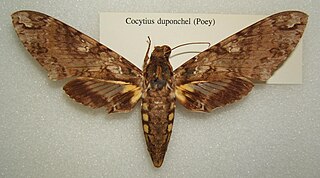 W
WAmphonyx duponchel, or Duponchel's sphinx, is a moth of the family Sphingidae. The species was first described by Felipe Poey in 1832. It is found in tropical and subtropical lowlands in Cuba and the West Indies and from Bolivia, southern Brazil and Argentina to Venezuela, Belize, Guatemala, Nicaragua, Costa Rica and Mexico. It is also found in Florida and Texas, where it is rare.
Anarpia incertalis is a species of moth in the family Crambidae. It is found in France, Spain, Portugal, Italy, Croatia, Bosnia and Herzegovina, Bulgaria, the Republic of Macedonia, Greece and on Corsica, Sardinia, Sicily, Crete and Cyprus, as well as in Iraq, Russia and North Africa, including Morocco.
 W
WAnthela nicothoe, the urticating anthelid, is a moth of the family Anthelidae.
 W
WApaidia rufeola is a moth of the family Erebidae first described by Jules Pierre Rambur, along with the help of American scientist C. Brown in 1832. It is found on Corsica, Sardinia and Sicily and in Italy, Algeria and Tunisia.
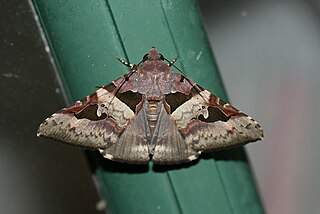 W
WAvatha bubo is a species of moth of the family Erebidae. It is found in Sundaland, Sulawesi, Seram, throughout India, Sri Lanka and Andaman Islands.
 W
WBlomer's rivulet is a species of the family Geometridae of moths, in the subfamily Larentiinae which includes the carpet moth and pugs.
 W
WThe bogong moth is a temperate species of night-flying moth, notable for its biannual long-distance seasonal migrations towards and from the Australian Alps, similar to the diurnal monarch butterfly. During the autumn and winter it is found in southern Queensland, western New South Wales, western Victoria, and also in South and Western Australia. Adult bogong moths breed and larvae hatch during this period, consuming winter pasture plants during their growth. During the spring, the moths migrate south or east and reside in mountains such as Mount Bogong, where they gregariously aestivate over the summer until their return towards breeding grounds again in the autumn.
Brachodes fulgurita is a moth of the family Brachodidae. It is found in Russia.
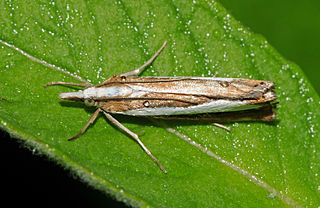 W
WCatoptria pyramidellus is a species of moth in the family Crambidae. It is found in France, Germany, Austria, Switzerland, Italy, Slovenia and Bulgaria.
 W
WChamaesphecia anthraciformis is a moth of the family Sesiidae. It is found in Italy and on Sicily, Corsica and Sardinia. It is also found in Morocco, Algeria, Tunisia and the Levant.
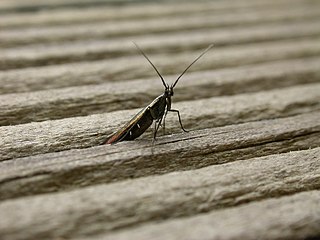 W
WThe clover case-bearer or small clover case-bearer is a moth of the family Coleophoridae. It is native to Asia, Europe and North Africa, and has been introduced to Australia and New Zealand.
 W
WColeophora binderella is a moth of the family Coleophoridae. It is found from Scandinavia and Finland to the Iberian Peninsula and Italy, and from Ireland to the Baltic States and Romania.
 W
WThe trefoil thick-horned tinea or large clover case-bearer is a moth of the family Coleophoridae. It is found in Europe, North Africa, Asia Minor, Afghanistan and North America.
 W
WCoscinia bifasciata is a moth of the family Erebidae. It was described by Jules Pierre Rambur in 1832. It is found on Corsica and Sardinia.
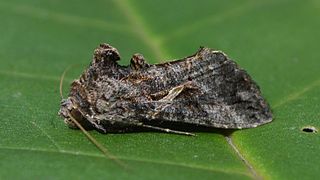 W
WCtenoplusia oxygramma is a moth of the family Noctuidae. It is found in southern Ontario, the eastern parts of the United States to Arizona. It has also been reported from Kansas, Nebraska, Iowa, Wisconsin, Mexico, the Antilles and from California south to Brazil and India Argentina.
 W
WDoryodes bistrialis, the double-lined doryodes moth, is a moth of the family Erebidae. The species was first described by Carl Geyer in 1832. It is found in the eastern United States, including Delaware, Virginia, Mississippi and Florida. Its habitat consists of wet pine flatwoods and pine savannas.
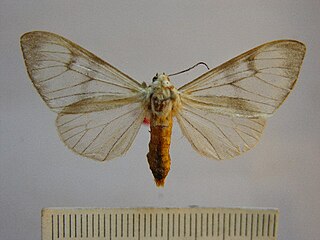 W
WDysschema amphissum is a moth of the family Erebidae first described by Carl Geyer in 1832. It is found in south-eastern Brazil, ranging from southern Minas Gerais and Rio de Janeiro, south to Rio Grande do Sul.
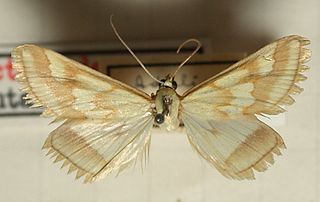 W
WEphelis cruentalis is a species of moth in the family Crambidae. It was described by Carl Geyer in 1832. It is found in southern Europe, from France east to Italy and Greece to Turkey and further east into central Asia.
 W
WEphelis pudicalis is a species of moth in the family Crambidae. It is found in France and Spain.
 W
WEtiella zinckenella, the pulse pod borer moth, is a moth of the family Pyralidae. It is found in southern and eastern Europe and in the tropics and subtropics of Africa and Asia. They have also been introduced to North America and Australia. It is usually a minor pest for many legumes, but can be a serious pest.
Eudonia vallesialis is a species of moth in the family Crambidae. It is found in France, Switzerland, Austria, Italy, Germany, Poland, Slovakia, Hungary, Croatia and Romania.
 W
WEupyrrhoglossum sagra, the Cuban sphinx, is a moth of the family Sphingidae. The species was first described by Felipe Poey in 1832. It is known from tropical and subtropical lowlands in Cuba and from Mexico and Belize to Guatemala, Costa Rica, Bolivia, Paraguay, Argentina and Uruguay. Occasionally, strays are found in Florida.
 W
WFilodes fulvidorsalis is a moth in the family Crambidae. It was described by Carl Geyer in 1832. It is found on Java and Seram.
 W
WFurcula borealis, the white furcula moth, is a moth of the family Notodontidae. It is found from New Hampshire to Texas and Florida, as well as in Colorado and South Dakota.
 W
WGnathothlibus eras is a moth of the family Sphingidae. It is known from the eastern Sunda Islands, Sulawesi, the Moluccas, the Philippines, New Guinea, the Solomon Islands, Micronesia and eastern Australia.
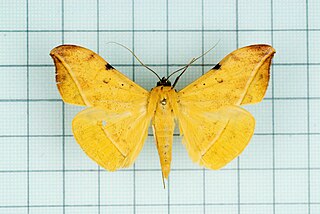 W
WHamodes propitia is a moth in the family Erebidae first described by Félix Édouard Guérin-Méneville in 1831. It is found in the north-eastern Himalayas, Myanmar, Thailand, Borneo, Sumatra, from the Philippines east to Queensland, the Carolines (Palau) and the Solomon Islands.
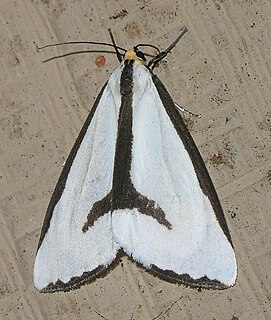 W
WHaploa lecontei, or Leconte's haploa, is a moth of the family Erebidae. The species was first described by Félix Édouard Guérin-Méneville in 1832. It is found in North America from Nova Scotia to Georgia, west to Manitoba through Arkansas.
 W
WHippotion scrofa is a moth of the family Sphingidae.
 W
WHydriris ornatalis, the ornate hydriris, is a moth of the family Crambidae. It has a wide distribution and is known from southern Europe, Asia, Australia, Africa and North America, where it is restricted to Florida.
Hypotia massilialis is a species of snout moth in the genus Hypotia. This species was first described in 1832 by the French entomologist Duponchel. Hypotia massilialis is present in the France, Spain, Croatia, Hungary, Romania, Bulgaria, the Republic of Macedonia, Ukraine, Russia and Turkey.
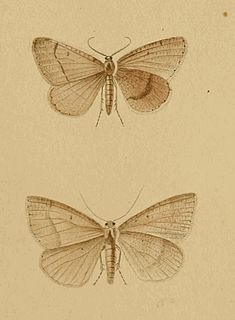 W
WIsturgia spodiaria is a moth of the family Geometridae. It was described by A. Lefèvre in 1832. It is found in Spain, Malta and North Africa.
 W
WMacroglossum alcedo is a moth of the family Sphingidae. It is known from Tanimbar, the Kai Islands, Aru, Papua New Guinea and Queensland.
 W
WMacroglossum hirundo is a moth of the family Sphingidae. It is known from the Cook Islands, Fiji, the Society Islands, Australia, Papua New Guinea, the Bismarck Archipelago and the Solomon Islands.
 W
WManduca jasminearum, the ash sphinx, is a member of the moth family Sphingidae. It ranges from east of the Mississippi River to the Atlantic Ocean, being common in the northeast United States.
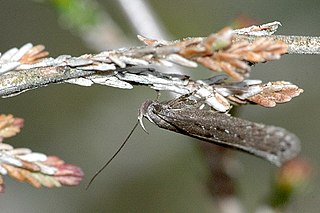 W
WNeofaculta ericetella is a moth of the family Gelechiidae. It is found in Europe and Asia Minor.
 W
WNyctemera annulata, the magpie moth, is a moth of the family Erebidae. The species was first described by Jean Baptiste Boisduval in 1832. It is endemic to New Zealand and found in all parts of the country.
 W
WNyctemera baulus is a moth of the family Erebidae. It is found from India to Samoa. Records include Queensland, Indonesia and New Guinea.
 W
WOdites kollarella is a moth in the family Depressariidae. It was described by Oronzio Gabriele Costa in 1832. It is found in Portugal, Spain, France, Italy, Croatia, Moldova and Greece, as well as on Corsica.
 W
WParasa indetermina, the stinging rose moth, is a moth of the family Limacodidae. It is found in the United States from New York to Florida, west to Missouri, Texas, and Oklahoma.
Pyrausta virginalis is a species of moth in the family Crambidae. It is found in southern Europe, Turkey, Armenia and Afghanistan.
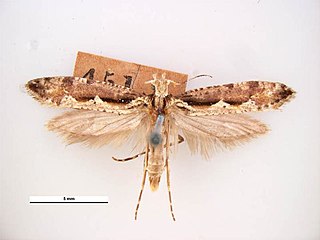 W
WRhigognostis annulatella is a moth of the family Plutellidae. It is found in most of Europe.
 W
WScoliacma bicolora is a species of moth of the family Erebidae. It is known from Papua New Guinea and most of Australia, including the Australian Capital Territory, New South Wales, Queensland, South Australia, Tasmania and Victoria.
 W
WSpilosoma jussiaeae is a moth in the family Erebidae. It was described by Felipe Poey in 1832. It is found on Cuba.
 W
WThe spiny oak slug is the larval form (caterpillar) of a moth in the family Limacodidae.
Stemmatophora borgialis is a species of snout moth in the genus Stemmatophora. It was described by Philogène Auguste Joseph Duponchel in 1832. It is found in France, Spain, Portugal and Italy.
 W
WStictonaclia myodes is a moth of the subfamily Arctiinae. It was described by Félix Édouard Guérin-Méneville in 1832. It is found on Madagascar.
 W
WStigmella hemargyrella is a moth of the family Nepticulidae. It is found in most of Europe, except Iceland, Norway, Finland, Portugal and most of the Baltic region.
 W
WTetragonus catamitus, the common butterfly moth, or Philippine callidulid moth, is a moth of the family Callidulidae. It was first described by Carl Geyer in 1832. Noted from Taiwan, north-eastern India, south-west India, the Andaman and Nicobar Islands, Sri Lanka, the Tenasserim Hills of Myanmar and from Java. They are day-flying moths that can be easily mistaken for a butterfly due to the position in which they hold their wings.
 W
WYponomeuta sedella is a moth of the family Yponomeutidae. It is found in Europe.
 W
WZygaena centaureae is a species of moth in the Zygaenidae family. It is found in Ukraine and Russia. It is similar to Zygaena cynarae and was once considered to be a form of that species.It has stronger antennae and the 5th spot is prolonged towards the hind angle.
 W
WZygaena fraxini is a moth of the family Zygaenidae.It is a Palearctic confined to Western Asia.